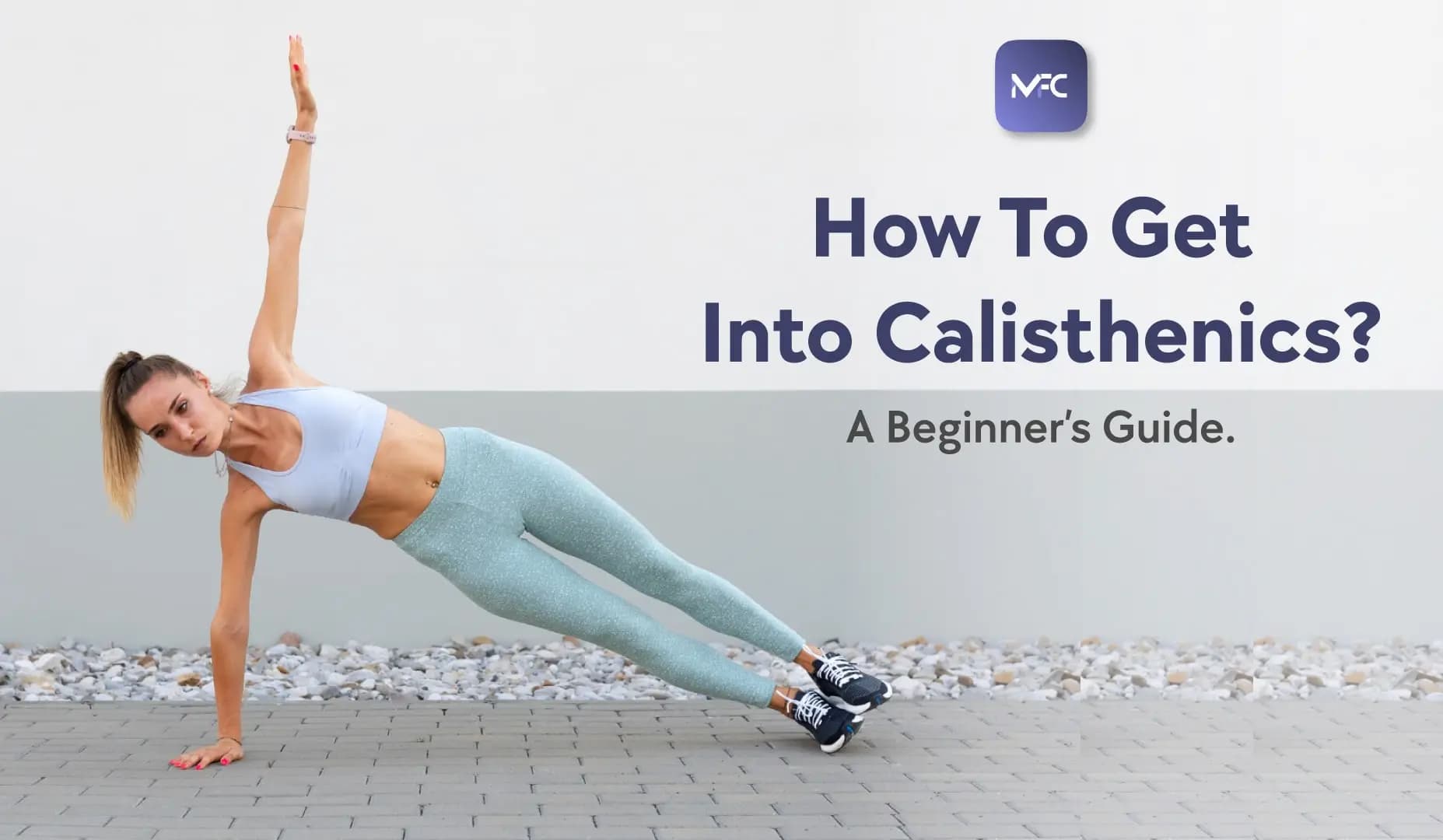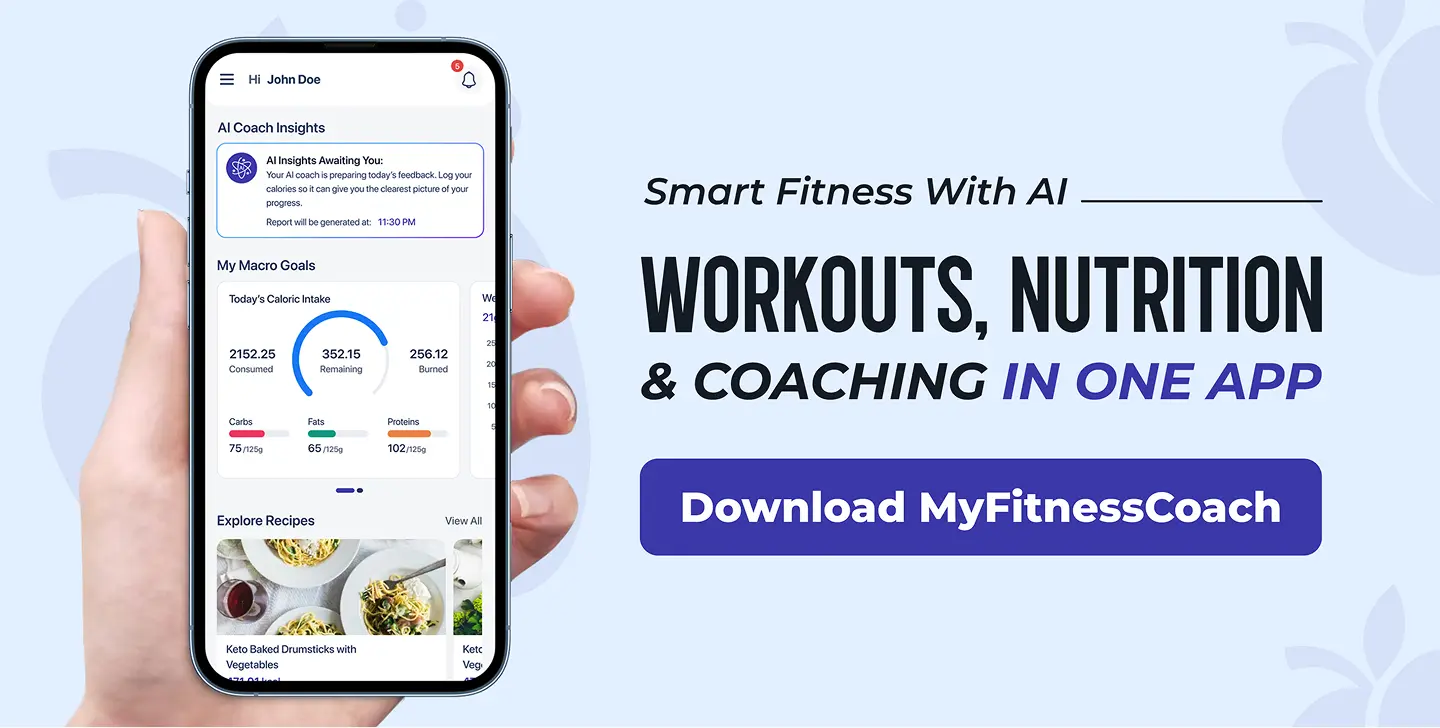How to Get Into Calisthenics? A Beginner’s Guide

MyFitnessCoach
April 10, 2025
Have you ever seen someone doing muscle-ups, handstands, or even planche push-ups and thought, “Wow! I wish I could do that too!”? That’s the magic of calisthenics — a form of bodyweight training that builds strength, flexibility, and control without fancy gym equipment.
Whether you’re a complete beginner or someone looking to spice up their fitness journey, calisthenics is a fantastic choice. In this article, we’ll break down how to get into calisthenics, step by step, using simple language so you can start strong and stay motivated.
Why Choose Calisthenics?
Here are a few reasons why calisthenics is one of the best training styles:
Builds Functional Strength
You get stronger in a natural way, using movements that mimic real-life activities.
No Equipment Needed
All you need is your body, a pull-up bar, and maybe a mat.
Increases Mobility and Flexibility
Calisthenics involves full-body movements, helping improve range of motion.
Boosts Endurance and Body Control
You learn to move and control your body better.
It’s Fun and Creative
There are always new skills to unlock, which keeps things interesting.
Step-by-Step: How to Get Into Calisthenics
Let’s walk through a simple, beginner-friendly roadmap to help you start your calisthenics journey with confidence.
1. Start With a Mindset Shift
Before anything else, know that everyone starts somewhere. You don’t need to be super strong or flexible to begin. Focus on progress, not perfection. Calisthenics is a journey, not a sprint.
2. Learn the Basic Movements
Mastering the basics lays a solid foundation. Begin with:
- Push-ups: Builds chest, shoulder, and triceps strength.
- Pull-ups (or assisted): Great for back and arms.
- Bodyweight squats: Builds leg strength and balance.
- Planks: Strengthens the core.
- Dips (bench or parallel bars): For chest and triceps.
- Leg raises: Work your abs and hip flexors.
If these feel tough, don’t worry! You can modify each movement to your level. For example:
- Do knee push-ups instead of regular ones.
- Try negative pull-ups (jump up, lower down slowly).
- Hold a plank on your elbows and knees.
3. Build a Simple Weekly Routine
Structure helps you stay consistent. Here’s a sample 3-day beginner calisthenics workout:
Day 1 – Push Focus (Upper Body):
- Push-ups – 3 sets of 8-12
- Bench dips – 3 sets of 10
- Plank – 3 rounds, hold for 30 seconds
Day 2 – Pull & Core Focus:
- Negative pull-ups – 3 sets of 5
- Bodyweight rows (under a table) – 3 sets
- Hanging leg raises or lying leg raises – 3 sets
Day 3 – Legs & Mobility:
- Bodyweight squats – 3 sets of 15
- Glute bridges – 3 sets of 12
- Calf raises – 3 sets of 20
- Stretching – 5–10 minutes
Tip: Rest 30–60 seconds between sets. Increase reps and sets as you get stronger.
4. Focus on Form Over Reps
Always prioritize good form. It’s better to do 5 perfect push-ups than 15 sloppy ones. Proper form prevents injuries and builds real strength.
5. Track Your Progress
Progress tracking keeps you motivated. Write down:
- How many reps/sets you did
- How long you held your plank
- Any improvements in your form
- New skills you tried
Apps like MyFitnessCoach make tracking your calisthenics progress easy and enjoyable.
6. Improve Flexibility and Mobility
Flexibility plays a huge role in calisthenics. Try to stretch for 5–10 minutes after each session. Focus on:
- Hamstrings
- Shoulders
- Hips
- Wrists
Add dynamic warm-ups before you start (like arm circles, leg swings, or shoulder rolls).
7. Be Consistent
Consistency beats intensity. Instead of doing one hard workout per week, aim for 2–4 moderate sessions. Over time, your body will adapt, and you’ll be doing advanced moves before you know it.
8. Gradually Increase Difficulty
Once the basics become easy, try harder versions:
- Regular → Archer → Diamond Push-ups
- Negative pull-ups → Assisted pull-ups → Regular pull-ups
- Bodyweight squats → Jump squats → Pistol squats
There’s always a progression. That’s what makes calisthenics exciting!
9. Learn a New Skill
Set a cool goal, like:
- Holding a handstand for 10 seconds
- Doing your first pull-up
- Mastering a muscle-up
Skill goals keep your training fun and purposeful.
10. Join a Community or Use a Fitness App
Surrounding yourself with others (online or offline) can be super motivating. You can:
- Follow calisthenics creators on YouTube/Instagram
- Join online forums or local meetups
- Use an app like MyFitnessCoach to follow structured programs and connect with other fitness lovers
5 Common Mistakes Beginners Make in Calisthenics
- Skipping the basics: Don't rush into advanced moves. Build your base first.
- Inconsistent training: Train regularly to see progress.
- Ignoring flexibility: Stiff muscles limit performance and invite injury.
- Doing too much too soon: Start slow, listen to your body.
- Neglecting recovery: Your muscles grow during rest, not during the workout.
Nutrition and Recovery Tips
You can’t out-train a bad diet. To support your calisthenics journey:
- Eat enough protein (eggs, chicken, lentils, tofu)
- Stay hydrated
- Get 7–9 hours of sleep
- Eat whole foods (veggies, fruits, whole grains)
- Avoid junk and processed food as much as possible
How MyFitnessCoach Can Help You Succeed in Calisthenics
Starting something new like calisthenics can feel overwhelming. That’s where the MyFitnessCoach app comes in. It’s like having a personal coach in your pocket. Whether you're doing your first push-up or working on your first handstand, MyFitnessCoach offers:
- Step-by-step calisthenics workouts
- Video tutorials with proper form
- Progress tracking tools
- Mobility & stretching routines
- Goal-based programs (like “Weight Loss” or “Strength Training”)
The app is beginner-friendly but grows with you as you level up. You can track your reps, get weekly plans, and even connect with a community of fitness lovers all on one platform.

Download MyFitnessCoach today and start your calisthenics journey with confidence. Whether you're training at home, in the park, or just getting started, the app gives you everything you need — from tutorials to full routines.
Make your first move. Your strongest self is waiting.
Similar Articles
Stay informed with these similar articles.

MyFitnessCoach
May 9, 2025
What Sweaty Kneecaps Means and 5 Tips to Prevent It?
Ever noticed your knees getting sweaty for no reason? You’re not alone. Sweaty kneecaps might seem odd, but they’re more common than you think.

MyFitnessCoach
March 6, 2025
Arm Swing Exercise: Effective Way to Boost Your Fitness
When it comes to fitness, we often think of intense workouts, heavy lifting, or long runs. But what if I told you that a simple exercise like arm swings could be just as effective in improving your overall fitness? Arm swing exercises are easy to do, require no equipment, and can be done anywhere. Whether you're a beginner or a fitness enthusiast, arm swings can help you improve flexibility, strength, and even cardiovascular health. In this article, we’ll explore the benefits of arm swing exercises, how to do them correctly, and how you can incorporate them into your fitness routine using the MyFitnessCoach app.

MyFitnessCoach
February 24, 2025
Best Deodorant for Athletes: Stay Fresh During Your Workouts
When you're an athlete or someone who loves to stay active, staying fresh and odor-free is a top priority. Whether you're hitting the gym, running a marathon, or sweating it out during a high-intensity workout, the right deodorant can make all the difference. But with so many options available, how do you choose the best deodorant for athletes? In this article, we’ll break down everything you need to know about finding the perfect deodorant to keep you feeling confident and fresh, no matter how intense your workout gets. Plus, we’ll show you how the MyFitnessCoach app can help you stay on top of your fitness game.
